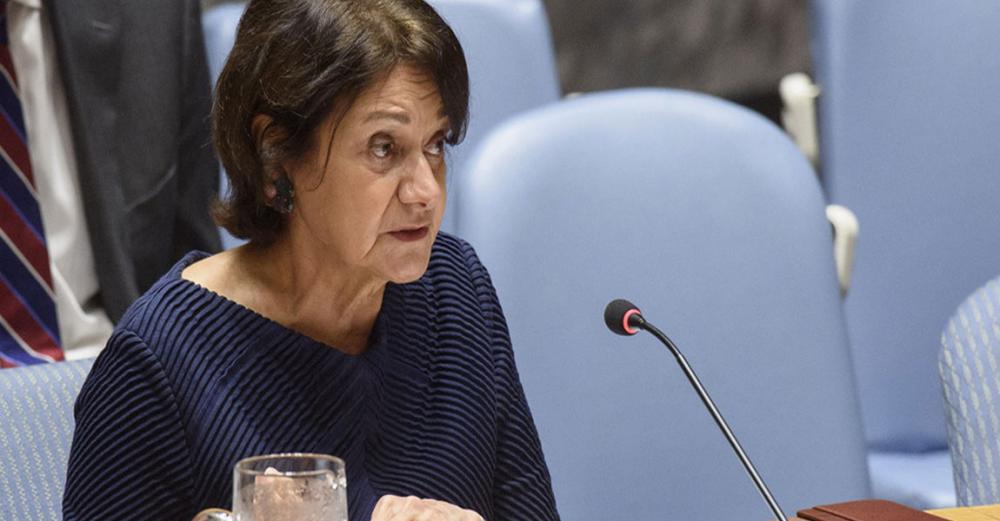Just Earth News | @justearthnews | 01 Jul 2020, 09:24 am Print

New York : The UN regrets that the future of the Joint Comprehensive Plan of Action (JCPOA) is in doubt, but notwithstanding current challenges, that landmark deal is still the best way to ensure that Iran’s nuclear programme proceeds along a peaceful path, the UN’s top political official said on Tuesday.
Rosemary DiCarlo, Under-Secretary-General for Political and Peacebuilding Affairs, told the Security Council that the 2015 agreement – which the Council endorsed through resolution 2231 – remains crucial to the global nuclear non-proliferation architecture and to regional and international security.
“It is therefore regrettable that the future of this agreement is in doubt”, she said, pointing to President Donald Trump’s withdrawal from the nuclear deal in 2018, the re-imposition of US sanctions and Washington’s decision not to extend waivers for oil trading with Iran.
Limits surpassed
She equally regretted that Iran, in response to the US withdrawal, has – under International Atomic Energy Agency (IAEA) monitoring – surpassed limits stipulated in the Plan of Action on uranium enrichment, its stockpiles of heavy water and low-enriched uranium, and nuclear research and development activities.
She appealed to Iran to resume full implementation of the JCPOA, and to address concerns raised by other countries regarding its actions inconsistent with restrictions set out in Annex B of resolution 2231.
Ms. DiCarlo addressed a videoconference meeting of the Council as its 15 members took up the Secretary-General’s ninth report on the implementation of resolution 2231 (2015) ahead of the scheduled expiration of a UN arms embargo on Iran on 18 October.
Iran implicated in Saudi attacks
Among other things, she said that, based on technical findings, and taking into account information provided by Iran, the Secretariat assessed that cruise missiles and delta-wing drones, or parts thereof, used in attacks on Saudi Arabia in 2019 were of Iranian origin.
She also said that the Secretariat has received information from Australia, Israel and Saudi Arabia regarding the alleged transfer of arms and related material from Iran, and that it will report back to the Council, if appropriate, in due course.
“Notwithstanding the current challenges to the JCPOA, it remains the best way to ensure the exclusively peaceful nature of Iran’s nuclear programme,” the Under-Secretary-General said. “Its full implementation, as well as faithful adherence to resolution 2231, is also fundamental to regional stability,” she said.
US calls for arms embargo extension
In the debate that followed, US Secretary of State Michael R. Pompeo – describing Iran as “the world’s most heinous terrorist regime” – said that Washington’s “overwhelming preference” is to work with the Council to extend that embargo that the Council put into place in 2017 through resolution 1747 (2007).
“Don’t just take it from me or from the United States…From Israel to the Gulf, countries in the Middle East – who are most exposed to Iran’s predations – are speaking with a single voice: Extend the arms embargo”, he said.
“This Council has a responsibility to listen to them.”
He warned that if the embargo is allowed to run out, Iran will be free to acquire Russian fighter jets, strengthen its submarine fleet, share new military technology with its Middle East proxies and hold a sword of Damocles over the region’s economic stability.
“We’ve imposed arms restrictions on Tehran in various forms for 13 years, and with good reason, and to substantial effect”, the Secretary of State said.
Don’t give in to US ‘intimidation’ Iran urges
Iran’s Minister for Foreign Affairs, Mohammad Javad Zarif, responded that if the Council falters, it will be a “generational setback” for multilateralism and the rule of law in the face of a US campaign of intimidation against international institutions.
Pointing to successive IAEA monitoring reports that found Iran in compliance with the Plan of Action, he said that Tehran has fulfilled all of its commitments in good faith, while Washington and its “enablers” have pressured the Secretariat into a one-sided interpretation of resolution 2231.
The international community in general, and the Council in particular, face a choice – to uphold respect for the rule of law or to return to the rule of the jungle by surrendering to the whims of an outlaw bully, he said.
He added that it is long overdue for the international community and the Council to hold the US accountable for its wrongful acts, including three wars in as many decades in the Middle East and economic terrorism against the Iranian nation.
Iran prefers constructive engagement, but it does not depend on others for its security, stability and prosperity, he said, adding that more than four decades of US pressure have failed to bring Iranians to their knees.
- Ali Khamenei (1939–2026): Iran’s Supreme Leader who ruled with an iron grip
- Trump signs 10% global tariff, says it takes effect ‘almost immediately’
- BJP wins a seat in Bangladesh — But not the one you think!
- Meet Shabana Mahmood: Could she take over as UK’s first Pakistani-origin Muslim PM?
- Dalai Lama's Office breaks silence on Epstein claims





-1763561110.jpg)
